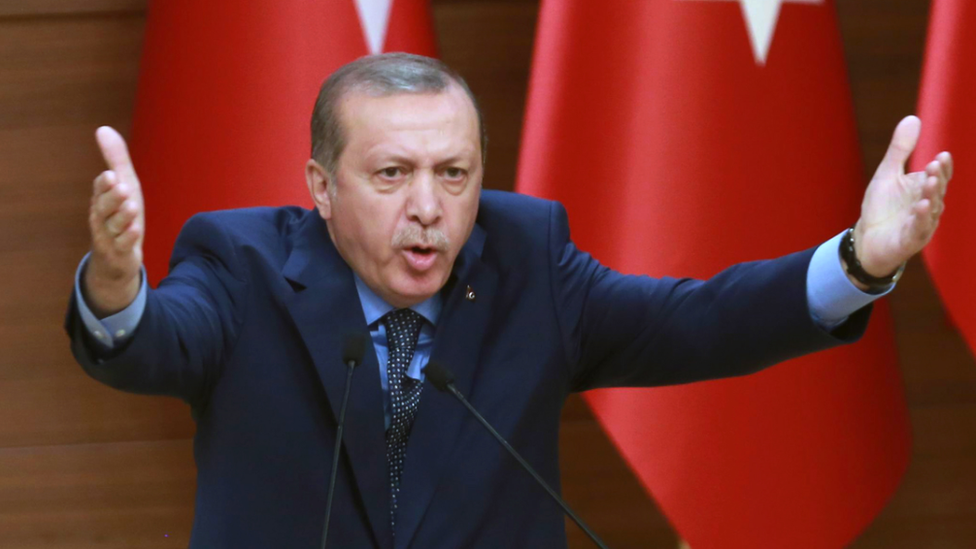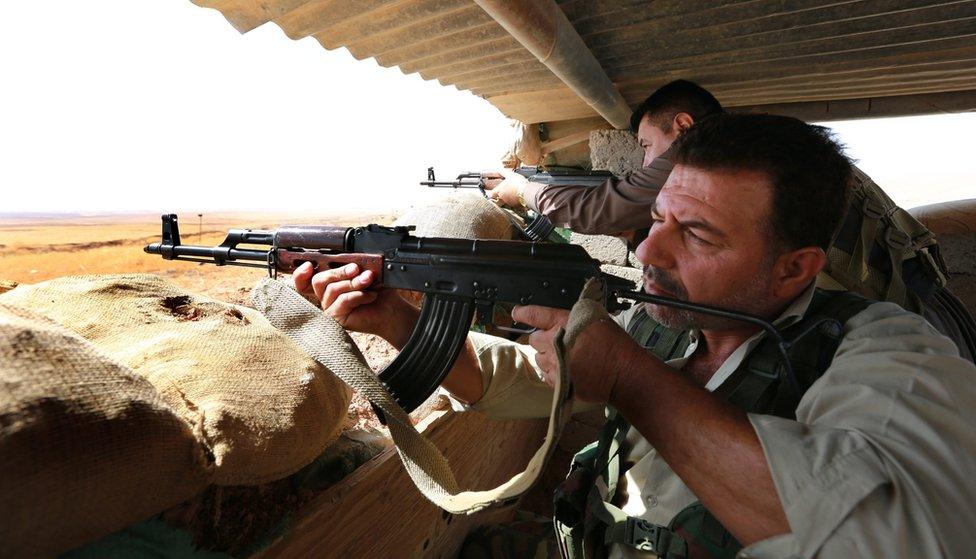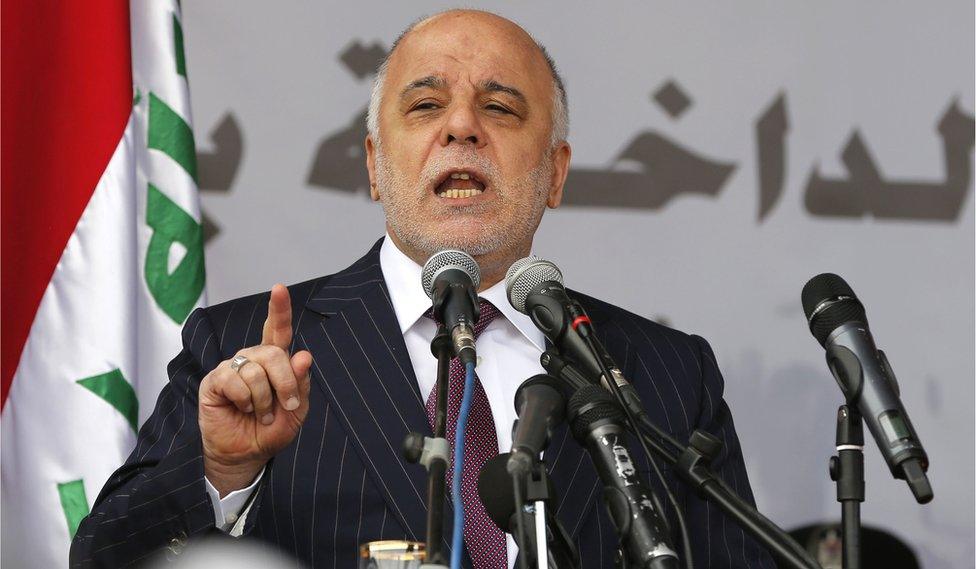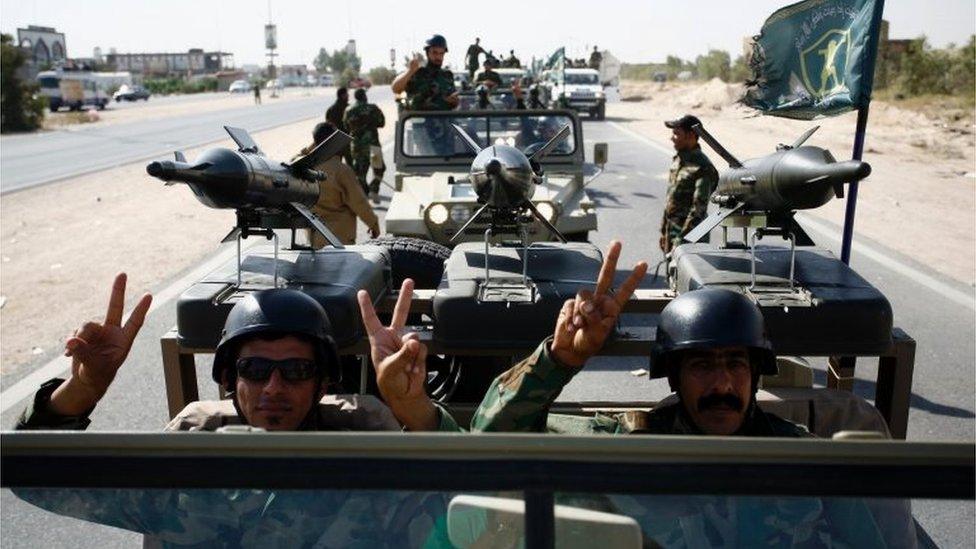Battle for Mosul: A row between Turkey and Iraq could derail the offensive
- Published

Recep Tayyip Erdogan told Iraq's prime minister: "You are not at my level"
Usually it's Western states that bear the brunt of Recep Tayyip Erdogan's anger, with tirades about their alleged support for terrorism, interference in Turkish affairs, or love of gold and cheap labour in the Muslim world. But this week, his target shifted.
"The Iraqi prime minister - know your place!" President Erdogan told Islamic leaders. "You are not at my level… the army of the Turkish republic has not lost such standing as to receive instructions from you," he added. "You should know that we will do what we want to do."
The cause of the escalating row is the presence of Turkish troops in northern Iraq. Around 2,000 Turks have been in the Bashiqa military camp since last year, training Sunni fighters and Iraqi Kurdish forces, known as Peshmerga, for the impending operation to retake the city of Mosul from the so-called Islamic State.
Their presence was with the consent of the semi-autonomous Kurdistan Regional Government (KRG) of northern Iraq, but apparently not of Baghdad. Iraqi Prime Minister Haider Al-Abadi has called them an "occupying force", risking "a regional war". Both Ankara and Baghdad have withdrawn ambassadors for consultation.

Kurdish Peshmerga forces are preparing to battle IS for the city of Mosul - but a row has broken out over the Turkish troops who are training them
The row threatens not only Turkey's participation in the Mosul operation but the offensive itself, with the Iraqi government locked in an explosive dispute with a key member of the anti-IS coalition. The United States says that all military activities in Iraq should be undertaken with the full coordination and consent of the Iraqi government.
"The US does not want a separate fight to distract it from the battle against IS," says Metin Gurcan, a military analyst and columnist for Al-Monitor. "The US line is: 'if Turkey wants to fight against IS in Iraq, it needs to come under our roof'. It's trying to prevent Turkey from playing a new game."
So what is Turkey's game? At its heart is the desire by Turkey, a major Sunni power, not to lose its influence over Mosul, which has a large ethnic Turkmen population, most of whom are Sunni. Ankara has had patchy relations with the Shia-led government of Haider Al-Abadi and bristles at the notion that Shia militias could take part in the Mosul offensive, with the Turkish prime minister warning against "any forceful change in the demographic composition of the region".
Turkey sees the PKK Kurdish militants in Turkey and the Kurdish militia in Syria as terrorists but has strong relations with the Iraqi Kurdish government, not least through oil exports from Iraqi Kurdistan through Turkey. Ankara is determined to keep forces allied to the PKK out of the Mosul operation.

Iraq's Haider Al-Abadi hit back at Mr Erdogan on Twitter
Islamic State conflict: How will the battle for Mosul unfold?
Is Mosul heading for a last 'apocalyptic' IS stand?
Iraq summons Turkish envoy over troops
"Ankara is trying to create a Sunni power centre in northern Iraq - a sort of 'Sunnistan' - through the KRG and Sunni tribes," says Metin Gurcan, "fighting for local dominance with sub-national armed actors. But it's playing in a room full of glass and with two elephants: the US and Russia. Turkey must work with the US as a Nato member. But on a political and diplomatic level, it's trying to align with Russia - and that creates a dangerous split."
In Ankara's rhetoric there is, as ever, much for domestic consumption. A firebrand president, he is known for using nationalist, confrontational talk to rally his core supporters, particularly in the patriotic fervour since July's attempted coup. It's unlikely that threats will translate into action, and Turkey will probably play a role in the Mosul offensive - at least providing air cover.
But the boiling tension between the two neighbours is distracting the focus.
In Baghdad, the prime minister took to Twitter to hit back at the Turkish President, alluding to Mr Erdogan's FaceTime call during the attempted coup in which he urged people onto the streets to resist the tanks.
"To @RT_Erdogan", Haider Al-Abadi wrote, external: "we are not your enemy and we will liberate our land through the determination of our men and not by video calls".
Turkey's President must be seething.
- Published4 October 2016
